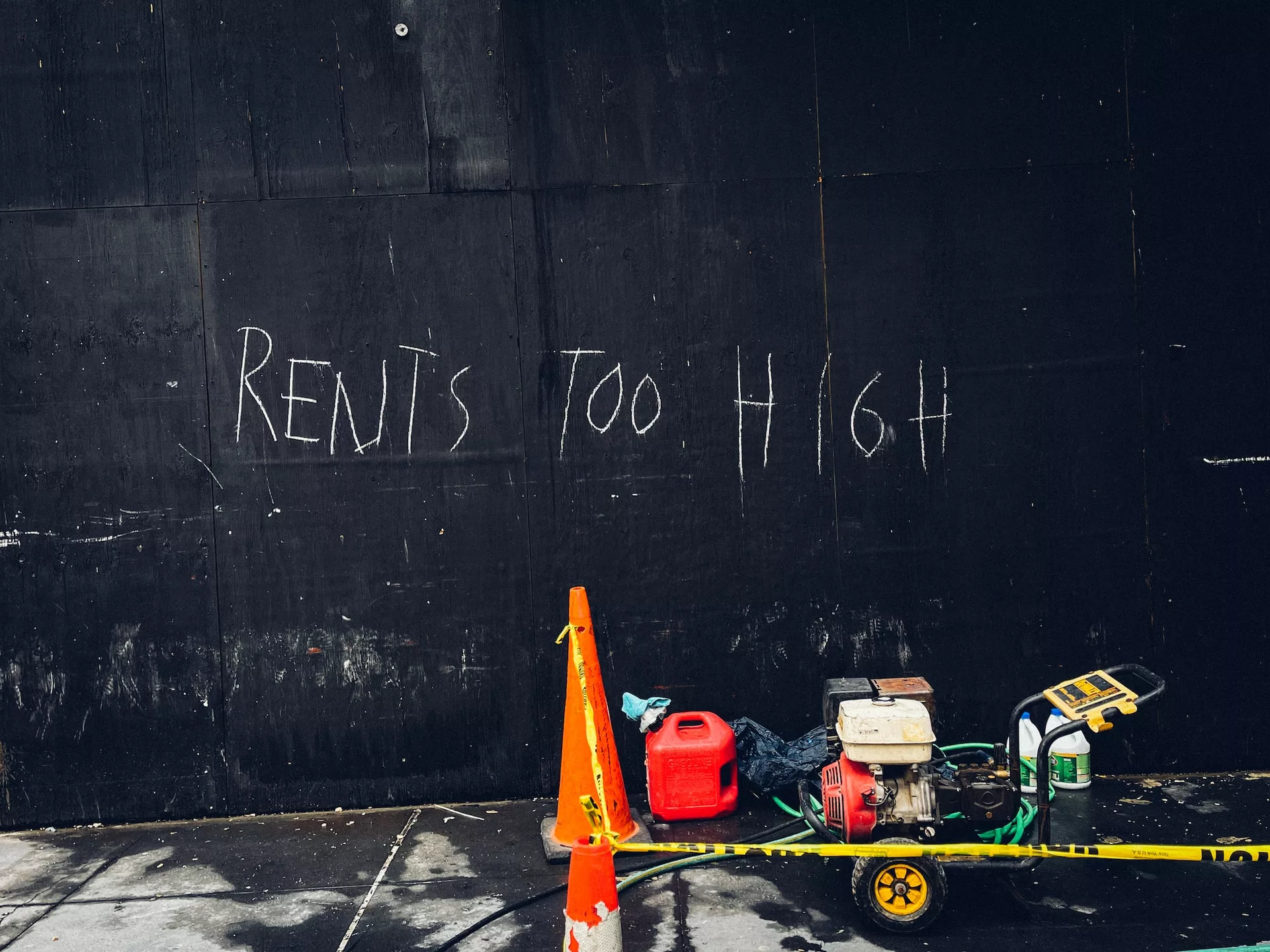While we are well aware that the finanical burden of renting a property impairs mental health, the stress caused can also alter our DNA. Photo credit: Jon Tyson via Unsplash
Imagine it’s a Tuesday night, you’re frying an egg. Suddenly, darkness. Your cooker stops. Scrambling to the coin meter, you realise it’s out of credit. In the dark, you search clumsily for a one-pound coin, instead you find a Euro. To your relief, it works; the lights come back on, the egg finishes frying. On Wednesday night, you hold up the line at the grocery store, asking for 10 pound coins in exchange for a note. Come Saturday morning, your landlady is outside your window gardening, or so it seems. Her every glance inside your home, a reminder that this is in fact not your house, but hers. You take the opportunity to complain about the mould in the closet and how it has ruined all your clothes. As you begin to explain how you would rather pay for fixed electricity instead of using a coin meter, she looks at you in a way that makes it understood – if you grumble too much, she’ll find someone who won’t. Feeling stressed just reading this?
Indeed, studies have shown that renting, particularly in the private sector, is associated with significantly increased anxiety. In fact, a third of private renters polled lost sleep at night due to worries regarding their property let. Not surprisingly, there are many factors that contribute to a renter’s mental wellbeing. Particularly, people who rent are more likely to experience financial insecurity, which for a plethora of reasons could lead to poorer mental and physical health.
However, new research from the University of Essex and the University of Adelaide has confirmed that, even when accounting for financial differences, private tenants suffer significantly higher stress than their property-owning or social-house renting counterparts. What’s more, not only does stress impact the mental health of private renters, but the data showed epigenetic changes in their DNA. Carried out across 1,420 UK homes, the study looked at the levels of DNA methylation in tenants’ genomes (all of a person’s genetic information). By altering a cell’s transcriptome (the DNA that gets translated into functional protein), DNA methylation drives cellular aging. It follows that such epigenetic, or reversible, changes to DNA act to accelerate biological aging or cause damage to the body’s cells and tissues, independently from the normal DNA wear-and-tear that occurs over time. Private tenants had higher levels of DNA methylation than people who lived in their own property or rented social housing, enough to suggest that such letting arrangements age a person twice as quickly as if they were obese and half as much as if they were to smoke, according to the DunedinPoAm DNA methylation algorithm. 39% of private renters reported that housing problems left them stressed or anxious, with 22% experiencing physical impact, and 21% reporting their housing situation negatively affected their work performances.
…even when accounting for financial differences, private tenants suffer significantly higher stress than their property-owning or social-house renting counterparts.
So, what kind of problems are making tenants toss and turn at night? The main culprits are cited as the inability to heat homes (26%) or pay rent (21%), accumulation of damp and mould (26%), and fear of eviction (19%). Bills and rent are usually the responsibility of the renter, but eviction decisions and the quality of the property being let, normally fall to the landlord. Mould, a fungus harmful for human health, grows in damp environments. The best way to reduce the risk of mould is by keeping a home warm and dry. Of course, a tenant could ramp up the heating, but financially and ecologically this approach is not sustainable. Adding insulation in walls, inserting better door and window fixtures, or fixing water leaks, would all be reasonable methods for tackling fungal growth. Yet, the renter is often not in a position to make these structural changes to a property.
Every year, the NHS spends about £1.4 billion on treating illness connected to damp and cold, with 904,000 homes in England classified as “damp” in 2021. 11% of these were private rented properties, more than twice that of social housing-occupied domiciles (4%), and more than five times that of owner-occupied homes (2%). Such data not only highlights the impact of poor living conditions on health, but also suggests that landlords hold different standards when it comes to their tenants’ home and their own domicile. Yet, if a renter were to point this out, they might be faced with retaliatory eviction.
The distress of living with mould impairs immunity overall and can even drive an individual to excess smoking, eating, and drinking.
When mould grows it releases spores into the air. These spores can trigger allergic reactions in 5% of the population, as well as potentially induce or exacerbate various diseases, including anxiety and depression. Mould encourages dust mites, bacteria, other moulds, and viruses. Damp can even impinge building materials and furniture, causing chemical reactions and deterioration, triggering the release of further harmful substances. Damp and mould are associated with eczema, eye irritation, respiratory, and cardiovascular diseases. More than 20% of US asthma cases are due to mould, according to the US Environmental Protection Agency. Respiratory infections can spread to other organs such as the brain, heart, and kidneys with potentially fatal results, particularly in children and the elderly. The distress of living with mould impairs immunity overall and can even drive an individual to excess smoking, eating, and drinking. But before you start lighting up, awaiting wrinkled doom in your private-let room with a no-smoking sign above the doorway, how likely are poor living conditions to have a significant impact on the healthcare system in the future?
Ever since the Covid-19 pandemic, working from home has been widely adopted. Before the pandemic, 12% of working adults reported working from home. In 2022, even after public health restrictions were lifted, 30% of working adults reported hybrid working (working from home at least once a week). Of course, high earners (more than a £40,000 annual salary) were found to be more likely to hybrid work, and elaborate studies are not needed to know that more lucrative professionals are also less likely to rent. The opposite is also true, with youngest (16-29 years) and oldest workers (50-69 year) least likely to hybrid work, despite being more susceptible to illness from sub-par habitation. So overall, the people spending more time in their homes are probably living in better conditions than the ones who commute.
However, with that said, the cost-of living crisis will have implications on the wider population. The average deposit for UK homes is currently sitting at £40,500. Thus, even higher earners are less likely to become homeowners in the future, and the simple option would be to rent privately. Indeed, the proportion of households occupied by private renters in 2022 was 19%, a marked increase to the 14% reported in 2008/2009, and overtaking the percentage of those in social housing. Yet, even renting has become difficult, with the cost of letting forecast to rise by more than 3% annually for the next five years.
While private letting has been equated to smoking and obesity by virtue of DNA damage, the probability of renting-related illnesses having a proportional impact on the healthcare system are yet to be elucidated. Further studies should be carried out to unearth the implications of sub-par living conditions on human health. Confounding variables, such as renters’ lifestyle and overall health, need to be more properly accounted for to determine causation and not just correlation. While there is no immediately obvious scientific solution to fixing poor renting arrangements, DNA methylation, and thus DNA damage caused by private-renting, is reversible however. Therefore, policy changes regarding renter’s rights could ameliorate overall societal health. Indeed, the government is developing solutions, such as The Renters (Reform) Bill, to tackle this problem. Until action is taken, we should remember, an animal’s habitat is vital to their survival and humans are not exempt.





